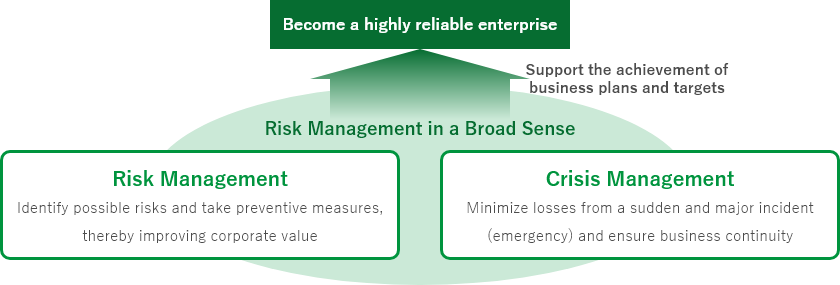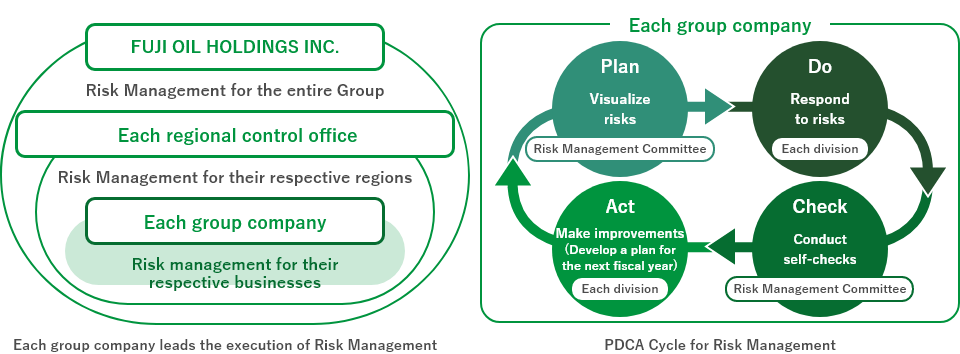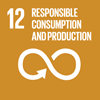Effective Risk Management
Focus SDGs
Management information
Relation between themes and business activities
The Fuji Oil Group believes that risk management* is corporate management itself.
To “contribute to the society by creating the future of delicious and healthy foods” and do “Work for people,” as advocated in the Fuji Oil Group Management Philosophy, we must ensure business continuity. And we believe that business continuity requires us to pursue risk management initiatives.
* Risk management: Preventing the realization of risks related to corporate management and minimizing their losses and impacts, to achieve business plans and targets
Basic approach
By promoting risk management, we aim to become a highly reliable enterprise that earns the trust of society. We will both implement management strategies and promote risk management in order to achieve business targets and plans and support our corporate management.
Positioning of risk management in the Fuji Oil Group

Promotion system
We promote our initiatives for effective risk management under the supervision of the Chief “ESG” Officer (C“ESG”O). Moreover, the ESG Committee*, which is an advisory body to the Board of Directors, confirms the progress and results of these initiatives as a priority theme for ESG management.
* Refer to the URL below for details of the ESG Committee.
https://www.fujioilholdings.com/en/csr/approach/
Objectives / Results
FY 2019 objectives
- Raising Group companies’ awareness of common risks and reducing the risks
- Enhancing the business continuity plan (BCP) of Fuji Oil Co., Ltd. and encouraging major Group companies outside Japan to formulate their own BCPs
- Introducing the Fuji Oil Group’s risk management system to Blommer Chocolate Company (U.S.)
FY 2019 results
To raise Group companies’ risk awareness and consequently reduce risks, we created risk awareness-raising tools in cooperation with related departments. We also regularly sent notifications to Group companies. As an endeavor to update the BCP of Fuji Oil Co., Ltd., we revised risk reduction, early recovery and alternative production measures. In addition, major Group companies drew BCP formulation roadmaps. Blommer Chocolate Company (U.S.), which recently joined the Fuji Oil Group, established a Risk Management Committee and began conducting risk management PDCA activities in the Fuji Oil Group’s style.
Next Step
To achieve the goal of “becoming a highly reliable enterprise that earns the trust of society,” the Fuji Oil Group will continue its efforts toward effective risk management. In FY2020, we will perform PDCA-based management of Group-wide significant risks and conduct scenario analysis based on TCFD recommendations. We will do this to promote Group-wide risk management, to respond to the Task Force on Climate-related Financial Disclosures (TCFD), and BCP formulation at major Group companies.
Specific initiatives
Risk management method adopted by each Group company
PDCA
The Fuji Oil Group clearly defined the role of each regional controlling office or Group company, and established a Risk Management Committee at each Group company. Each Risk Management Committee plays a leading role in the annual implementation of the PDCA cycle: Plan (identify all possible risks and select major risks) → Do (implement countermeasures) → Check (conduct checks) → Act (take improvement action toward the next fiscal year). The Fuji Oil Group promotes risk management through close collaboration among Fuji Oil Holdings, regional controlling offices, and Group companies.
In the event of an emergency, an Emergency Headquarters will be established based on the Risk Management Committee, which promotes risk management activities in ordinary times, so that we can respond to the emergency quickly and appropriately as the Fuji Oil Group.
Fuji Oil Group's risk management

Risk assessment method
The Risk Management Committee of each Group company takes the central role in identifying its own company's risks and assessing them by plotting them on a risk map (vertical axis: degree of damage to/impact on the company; horizontal axis: possibility of realization of risk). As a result of the assessment, the Committee specifies risks that would cause a significant degree of damage to/impact on its company as “significant risks,” and decides how to respond to all “significant risks” to mitigate the potential impact. Through this process, each company conducts risk management to clarify which risks it should manage on a priority basis, and works to prevent the realization of risks, minimize losses when risks are realized, and maintain business continuity.
Identification of Group-wide significant risks
In FY 2019, we established and began operating a system to identify Group-wide significant risks* from information sources, such as risk awareness among management executives, the materiality map, and Group companies’ risk maps.
* Refer to the URL below for details of identified Group-wide significant risks.
https://www.fujioilholdings.com/en/ir/policies_and_systems/risk/
Climate change risks and opportunities
Fuji Oil Holdings, which is responsible for formulating the Group's overall management strategy, manages the risks and opportunities associated to climate change. Various relevant divisions, including the CSR, risk management, and environmental divisions, collect information on climate change through their expert perspectives from publicly disclosed data and through dialogue with industry groups and stakeholders. The Group's climate change strategies are developed based on the collected information, and reported at meetings of the ESG Committee, which is an advisory body to the Board of Directors, before being proposed to the Board of Directors. Moreover, we manage climate change-related risks through the Fuji Oil Group’s overall risk management system.
In May 2019, we declared our support to the Task Force on Climate-related Financial Disclosures (TCFD), and conducted the TCFD-recommended climate change scenario analysis in FY 2019.
The analysis has revealed that a 4°C increase in the average temperature will likely have a major impact on our business operations and procurement of some raw materials, due to suspension of plant operations driven by to natural disasters. To address such risks, we will continue to reduce our group-wide CO2 emissions through energy-saving activities and use of renewable energy. In this way we will contribute to achieving a zero-carbon society. Meanwhile, it is expected that a zero-carbon society will see the growth of the market for plant-based food, in which the Fuji Oil Group’s strengths lie. This is an opportunity associated with climate change. Backcasting from the perspective of society in 2050, the Fuji Oil Group conducts its businesses under the concept of “plant-based food solutions” (PBFS), that is, solutions to social issues, provided using plant-based food ingredients. There is public concern about shortage of food resources, such as milk and meat, in the future. We will provide delicious and healthy plant-based food ingredients as solutions to future food shortage. From now on, we will conduct scenario analysis globally and assess financial impacts to reflect the results of analysis and assessment in our business strategies.
Risks and opportunities associated with climate change
* Expected risk/opportunity occurrence period: “Short-term”: Period until 2025, “Medium-term”: Period from 2025 to 2030, and “Long-term”: Period from 2030 to 2050.
*2 Relevant scenario: The symbol “○” indicates the scenario (2°C-increase scenario or 4°C-increase scenario) in which the risk or opportunity, described in the column “Details”, will become especially prominent.
![]()
| Item | Details | Expected occurrence period* | Relevant scenario*2 | ||||
|---|---|---|---|---|---|---|---|
| 2℃ | 4℃ | ||||||
| Risk | Transition risk | Policy & regulations | Increased cost of complying with environmental regulations | Production costs are expected to increase mainly due to tightened CO2 emissions regulations and the introduction of a carbon footprint system and a carbon tax, the purchase of emission quotas, and investment in renewable energy equipment. Logistics costs are expected to increase mainly due to restrictions on the number of delivery vehicles and the carbon tax’s impact on fuel. As a result, there is a risk of a profit decline. | Medium-term | ○ | |
| Technology | Increased R&D cost | A cost increase is expected due to the need to reduce environmental impacts through intensive efforts to explore new raw materials and develop new food ingredients and applications. As a result, there is a risk of a profit decline. | Long-term | ○ | |||
| Market | Sustainability-conscious consumers・Failure to fully meet needs and product demand | There is a risk of losing market share to competitors and of failing to achieve sales as planned if we cannot promptly or fully respond to the global needs and product demands of sustainability-conscious consumers. | Medium-term | ○ | |||
| Reputation | Insufficient environmental measures | There is a risk of damage to our reputation, loss of our major customers, and of resulting sales decline if we are criticized by society for our insufficient environmental measures, including CO2 reduction measures, or indirect involvement in deforestation through our suppliers. | Short-term | ○ | |||
| Physical risk | Acute risk | Suspension of operations or supply chains | Stockout and sales decline are expected if our plants or suppliers suspend operations, our distribution channels are destroyed, or our warehouses are damaged under the increasing impact and frequency of natural disasters. These include storm surges associated with sea level rise, typhoons, and floods. These factors are also expected to increase the cost of BCP initiatives and insurance premiums. As a result, there is a risk of profit decline. | Medium-term | ○ | ||
| Chronic risk | Difficulty in procuring some major raw materials | There is the risk that the production of some major raw materials will decrease significantly due to the increased average temperature. As a result we will face procurement difficulties due to decreased cultivated acreage, extreme weather, and intensification of diseases and harmful insects caused. | Long-term | ○ | |||
| Increased production and logistics costs | The increased average temperature is expected to raise production costs; for example, costs of occupational safety and health, response to the reduction of the capacity of cooling equipment, production efficiency, and production quality. The temperature rise is also expected to increase logistics costs like the cost of temperature adjustment equipment for delivery vehicles. As a result, there is a risk of a profit decline. | Medium-term | ○ | ||||
| Opportunity | Resource efficiency | Reduced production and logistics costs | It is expected that energy-saving activities will help reduce the cost of equipment operations, and that promotion of collaborative delivery, modal shift, etc. will enhance the efficiency of delivery. As a result, there is an opportunity for lower logistics costs. | Medium-term | ○ | ||
| Energy sources | CO2 and cost reduction through use of renewable energy | Promotion of the introduction of solar panels and the purchase of Renewable Energy Certificates helps reduce CO2 and costs. | Short-term | ○ | |||
| Products & services | Increased demand for heat-resistant foods, emergency foods and highly nutritious foods | The increased average temperature and the growing impact of natural disasters are expected to increase demand for long-life and highly nutritious foods. We can use our technologies for antioxidation, heat-resistance, and soybean processing, to develop heat-resistant foods, emergency foods, foods for heat stroke patients, etc. As a result, we can create an opportunity for our sales growth. | Short-term | ○ | |||
| Increased demand for some products due to temperature rise | The average temperature rise is expected to increase demand for beer-like beverages, ice cream, and refrigerated noodles. We can create an opportunity for the sales growth of our ingredients used in those products. | Medium-term | ○ | ||||
| Market | Expanded PBF market | Public awareness of the environment and ethics-driven consumption are expected to increase the demand for PBF* products and to expand the PBF market. As a result, there will be an opportunity for growing sales through wider applications of our original alternative and hybrid technologies. * PBF: Plant-based food |
Short-term | ○ | |||
| Resilience | Corporate value increased by building the optimal sustainable business portfolio | Promotion of energy savings and the use of renewable energy will help us reduce environmental impacts and build the optimal sustainable business portfolio, which meets social needs. As a result, there will be an opportunity to earn social trust and increase our corporate value. | Medium-term | ○ | |||
| Corporate value increased by formulating a reliable BCP | The formulation of a reliable BCP in anticipation of natural disasters will help us meet customer demand and build strong trust relationships. As a result, there will be an opportunity to earn social trust and increase our corporate value. | Short-term | ○ | ||||
Business continuity plan (BCP)
The Fuji Oil Group could neither “contribute to the society by creating the future of delicious and healthy foods” nor do “Work for people” if it fails to ensure business continuity. This requires having and implementing a good business continuity plan (BCP). We will promote our BCP initiatives under the following BCP Policy in order to ensure employee safety, minimize damage to business assets, and enable the continuation or early restoration of our core businesses. More specifically, we review our BCP in anticipation of natural disasters, major accidents, and epidemics or pandemics, and strive to formulate a BCP for ICT (ICT-BCP) to ensure the continued functioning of information systems in the event of natural disasters.
BCP Policy
- Give priority to the lives of employees and visitors.
- Prevent secondary disasters and do not disturb local communities.
- Fulfill our responsibility as a company to supply products.
Education and incentives
Educational and awareness-raising activities
We conduct risk management education and awareness-raising activities for our Group companies through regular visits, video conferences etc. In this way, we establish firmly the PDCA cycle for risk management and improve the quality of risk management at each Group company. In addition, we educate new posted employees abroad on the fundamentals of risk management and the risk management system of the Fuji Oil Group. This is done as part of their pre-assignment training.
Incentives
We established ESG management awards as a system to praise departments and Group companies for their good ESG practices. Achievements in the field of risk management are also included in this award.
Information Security Management
Focus SDGs
Management information
Relation between themes and business activities
Risk management is important for Fuji Oil Group’s business activities and its contribution to society. In the context of the growing value of digital data, an essential aspect of risk management is information security management. Information security management is also important to protect data rigorously; not only the company’s management data but also those of customers and employees.
Basic approach
The Fuji Oil Group works to improve its security level to safeguard its information systems against surrounding threats, and protect and maintain the confidentiality, integrity and availability of its information assets. We formulated Information Management and Information Security Regulations. Employees are trained on a continual basis to ensure that they understand and follow these regulations. On a technical level we are taking multilayered measures to prevent unauthorized access from outside the Group's information systems and to protect against computer viruses. We will further raise our information security level through a process of review, verification and improvement.
Promotion system
We promote our initiatives for effective risk management under the supervision of the Chief Financial Officer (CFO). Under the CFO, the Chief Information Management Officer and a Computer Security Incident Response Team (CSIRT) were appointed. Each Group company also has a CSIRT, which includes a person in charge of information management and a person in charge of information security. We aim at raising all Group companies’ information security levels according to a well-planned schedule, with the advice of external experts.
Moreover, the ESG Committee,* which is an advisory body to the Board of Directors, confirms the progress and results of initiatives for information security management as a priority theme for ESG management.
* Refer to the URL below for details on the ESG Committee.
https://www.fujioilholdings.com/en/csr/approach/
Objectives / Results
FY 2019 objectives
- Achieving maturity level 3 of COBIT (Control Objectives for Information Technologies)*
* COBIT: A framework for assessing the maturity level of IT governance on a scale of 0 to 5. The highest maturity level is 5 (optimizing). As of April 2019, we were placed between levels 1 and 2.
FY 2019 results
In FY 2019, we focused on adopting countermeasures against ransomware* infection and fulfilled the above-mentioned objective of achieving the desirable COBIT maturity level. We have not suffered damage from ransomware since adopting the countermeasures. Some Group companies in China have not yet completed some of the countermeasures due to the impact of COVID-19. They will resume the implementation of the countermeasures after the situation stabilizes.
* Malware that makes infected computers and files inaccessible and demands a ransom from users for access to the computers and files
Next Step
We will ensure that safe and secure ICT is available to the Fuji Oil Group in order to achieve process reforms, corporate value creation, and group governance. The Fuji Oil Group aims to become an enterprise that can earn the trust of society, including business partners, by devoting Group-wide efforts to information security activities. In FY 2020, we will continue implementing the same measures as in FY 2019 and adopt additional measures for new themes, such as prevention of information leakage. With this, we aim at achieving COBIT maturity level 4. In addition, we will continue providing Group company employees in and outside Japan with training programs to raise their awareness on information security.
